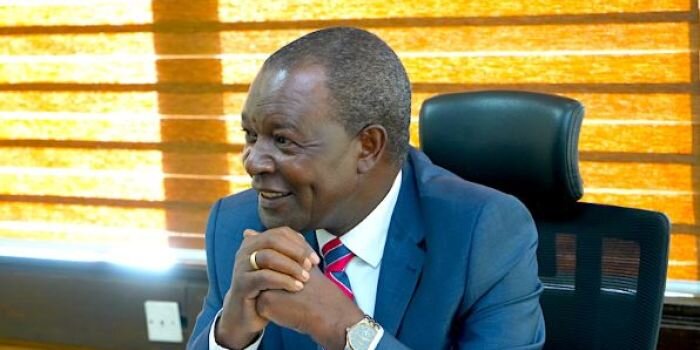Why all eyes will be on CS Ndung’u
By Noel.Wandera, June 15, 2023This afternoon, all eyes in Kenya will be on the National Treasury Cabinet Secretary Njuguna Ndung’u, as he presents President William Ruto administration’s ambitious Sh3.6 trillion national budget in the National Assembly, against the background of deep polarisation over the proposed tax measures in Kenya Kwanza’s first spending plan.
Prof Ndung’u, who became Treasury CS in September will be followed keenly by Kenyans as he presents the estimates that are hinged on the bottom-up economic approach and the Kenya Kwanza bottom up manifesto.
This will also be his first budget speech under the fifth administration led by President Ruto, an advocate of revenue mobilisation, a script Ndung’u is expected to read from, according to macro-economic experts.
“Ndung’u appears resolute on revenue mobilisation, by expanding the tax base,” said Ronny Chokaa, an analyst at Genghis Capital. “Furthermore, despite the narrow fiscal headroom, he is intent on unlocking the economy’s revenue potential to contain Budget deficit, debt and also slow down public debt accumulation.”
High cost of living
Though the strategy will be challenging to implement, given the high cost of living and rising debt-service expenditures, the CS is expected to draw from his previous experience as Central Bank of Kenya (CBK) Governor to navigate the murky waters.
While at the CBK, Ndung’u, an economist, was criticised for failing to spot and act against rising commodity price pressures and then presiding over the shilling’s decline against the dollar.
Nevertheless, the CS extricated himself from the difficult position by raising the key lending rate by a staggering 400 basis points and by launching a round of increases that strengthened the currency to below Sh90 against the greenback. He also changed borrowing rules from the discount window as well as how the rate was calculated, and curbed commercial banks’ foreign exchange exposure.
The Budget Policy Statement for the Financial Year 2023/2024 — which he will read today — has projected a 14 per cent growth in total expenditure to Sh3.6 trillion, but there is also a historic flatline in recurrent expenditure growth. The bulk of the increase in spending is due to the Consolidated Fund Services, which include pension payments and dzebt servicing.
According to Chokaa, while it will be prudent for Ndung’u to contain expenditure growth, this could also diminish the impact of the Budget multiplier on economic growth.
The macroeconomist also said Ndung’u appears to operate on the assumption that it will be easy to raise affordable debt financing across domestic and international markets.
Rising interest rates
In his view, this might be difficult, given the rising interest rate environment, which will make it difficult for the CS to tap concessional debt financing across international markets, a move that might force Treasury to focus on growing internal revenue channels as a sustainable recourse. This could partly explain the government’s insistence on the housing tax, which has been pegged at 1.5 per cent of formal sector workers’ pay. This tax will be matched by a similar payment by their employers.
Ndungu’s Budget plans will be facing an uphill task to tax the informal sector and shore up taxes to finance expenditure as devolved units continue to play hard ball despite struggling with revenue mobilisation.
In the draft Finance Bill, 2023, tax base expansion was mainly targeted through the narrowing of the Turnover Tax (ToT) threshold and rolling out of a compulsory electronic Tax Invoice Management System (eTIMS).
Experts, however, warn that since Kenya Revenue Authority (KRA) lacks access to the business license issuance system held by devolved units, the tax authority is toothless in tracking compliance to the ToT regime, which is mainly payable by small businesses.
It is expected that the Ndung’u regime at Treasury will draw parallels with that of President Mwai Kibaki’s Economic Recovery Strategy of 2003 to 2007, as he has shown a drive to re-organise the tax administration to prioritise taxing wealth, consumption, income and trade.
Elicited debate
The tabling of the Finance Bill, 2023 in the National Assembly spurred a flurry of activities from different corners as different players in the private sector and the public sought to share their views on the proposed changes to the various tax laws.
Based on the proposed changes, it was clear that the government’s main objective was to raise additional tax revenue amidst the limited fiscal space due to the prevailing high debt levels and a sub-optimal performance in tax collections.
Before his appointment as the eighth CBK governor for two consecutive four-year terms, from March 2007 until March 2015, Ndung’u was executive director at the African Economic Research Consortium. The 63-year-old economist was trained at the University of Nairobi and University of Gothenburg in Sweden.
“Through the appointment, the President has given me the honour and privilege to serve my beloved country again, this time as a Cabinet Secretary,” he said during his farewell at the consortium.
Banking on his professional training and lifelong academic endeavours in economic policy, planning and research, he promised to serve as Cabinet Secretary, a role that has put him squarely in the cross hairs of the public today as he outlines the Kenya Kwanza’s tax-and-spend plan.
His appointment as CS was a tribute to his contribution to the continental economic policy body of knowledge through his role at the consortium, and the ball is now squarely in his court to show what the government can do to win public support for the spending plan and to convince the Opposition to go easy on its rejection of the new tax policies he will be outlining today.
